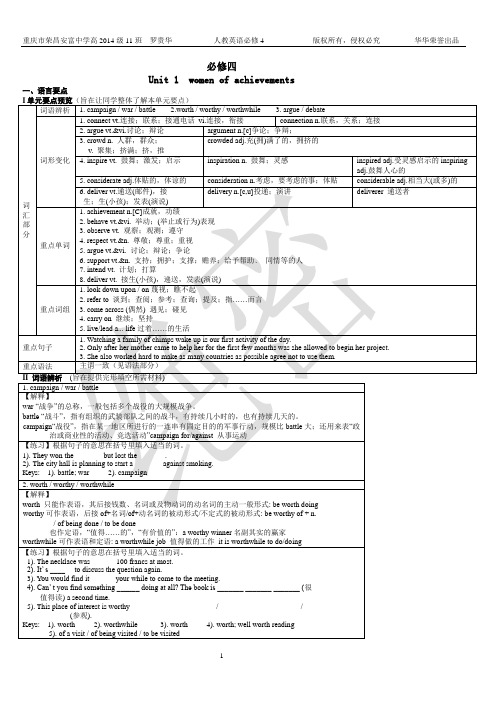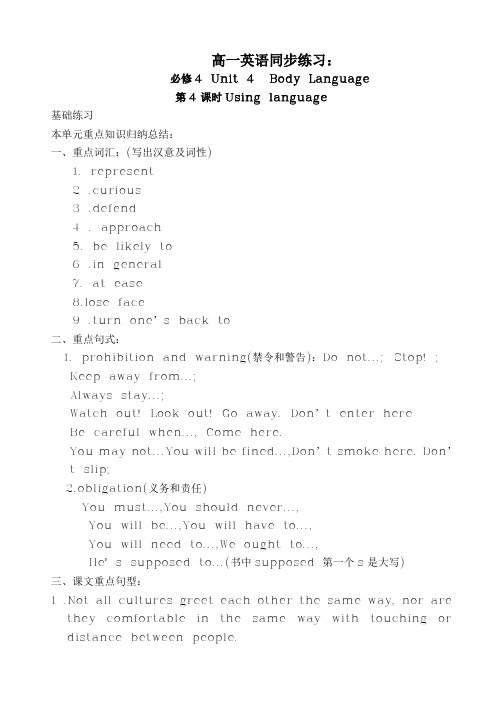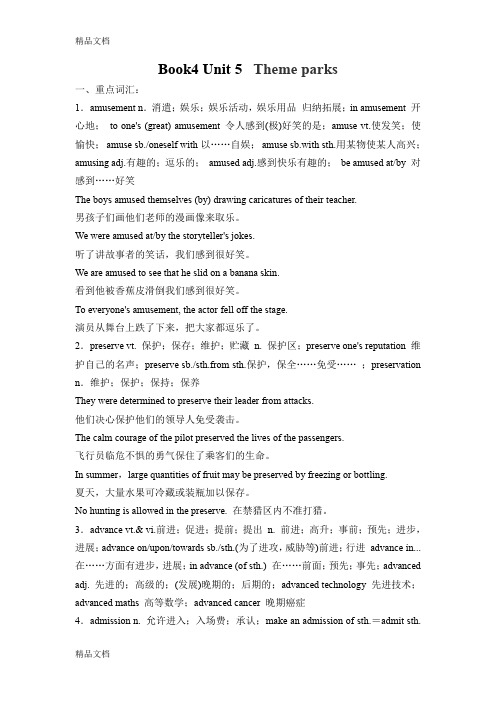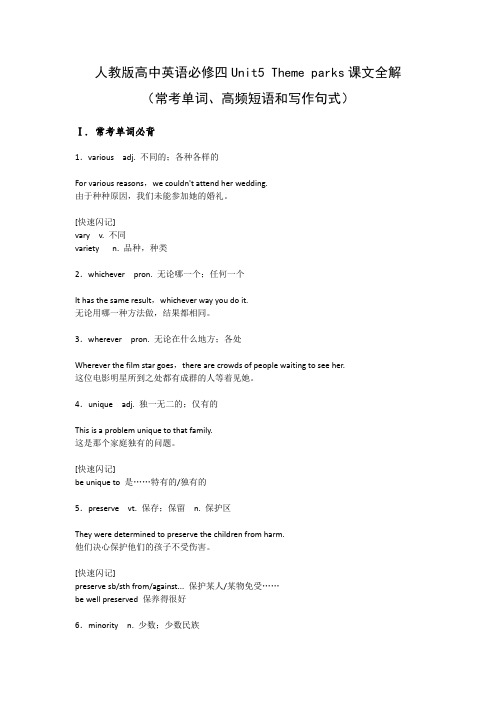人教版高中英语必修4重点词汇语法知识点讲解整理
高中英语必修四资料

必修四Unit 1 women of achievements 一、语言要点3). Congratulations to you (介词) _______ such a complete victory.Keys: 1). achieve nothing 2). what 3). on; achieving3. observe vt. 观察;观测;遵守observation n.[u] 观察;观测;监视[典例]1). The police observed the man entering/enter the bank. 警方监视着那男子进入银行的情况。
2). The woman was observed to follow him closely. 有人看到那女子紧跟着他。
[重点用法]observe sb. do sth. 观察某人做某事(已做完) observe sb. doing sth. 观察某人正在做某事under observation 被监视[练习] 用括号内所提供词的适当形式填空或翻译。
1). They were observed ______ (enter) the bank then.2). Keynes _______ _______ (观察到) humans fall into two classes.Keys: 1). entering 2). observed that4. respect vt.&n. 尊敬;尊重;重视[典例]1). If you don‟ t respec t yourself, how can you expect others to respect you? 自己不自重, 又怎能受到别人尊重呢?2). I have the greatest respect for you. 我非常尊敬您。
[重点用法]respect sb. for sth. 因某事而尊敬某人have / show respect for sb./sth. 尊敬某人/事gain/get/earn/win the respect of sb. 赢得某人的尊敬out of respect 出于尊敬[练习] 根据句子的要求在括号里填入适当的词或翻译。
高中英语人教版必修四课件:Unit+4+Body+Language+语法专题课

Task 1
呈现新知
1.Yesterday, another student and I, representing our university’s student association _______________________________________ , went to the Capital International Airport to meet this year’s international students. 2.I saw several young people enter the waiting area, looking around curiously ____________________________. watching them 3.I stood for a minute_____________________ and then went to greet them. appearing surprised 4.She stepped back _________________. 5.Then Akira Nagata from Japan came in ___________. smiling 6.Just at the moment, however, Akira bowed so his nose touched ____________________. George’s moving hand
指点迷津 指点迷津
现在分词作定语在句中位置
单个的现在分词放在 它所修饰词前面
现在分词词组放在它 所修饰词的后面
II. Translate
Hearing the news 1. __________________ (听到这个好消息), we were all excited. knowing his address 2.Not ______________________ (不知道他的地址), we couldn’t get in touch with him. talking with another teacher (同另一个 3. The teacher stood there, ________________________ 老师谈话). 4. ______________________( 往右转), you will find the post office . Turning to the right 5. I turned off the light,________________________( 所以什么也看 seeing nothing 不见). what he said 尽管相信他的话), we still think that he 6.Admitting ___________________( hasn’t tried his best. shopping 购物) together. 7. After a discussion, our family went _________( Judging from her appearance (从她的外表看), she seems to 8. ___________________________ be a doctor.
人教版2019高中英语选择性必修第四册Unit 5知识讲解

单元重难知识点复习
Ⅰ. 重点词汇 1. debt n. 债务; 欠款 【教材原句】
Help and advise people in serious debt. (P50) 帮助并向负债累累的人提建议。
【词块必记】 be in heavy debt in debt to sb. = in sb. ‘s debt be/get out of debt
【词块必记】 (1)accuse sb. of (doing) sth. =charge sb. with(doing) sth. (2)the accused (3)accusation
因(做)某事指控某人 被告 n. 控告; 控诉; 指控
【知识拓展】 “v. +sb. +of+sth. ”结构大集合
【典句赏析】
With the College Entrance Examination approaching, you must dedicate your attention to your study. 随着高考的临近, 你必须将注意力投入到学习中。
3. attend vt. 出席; 参加; 照顾; 护理; vi. 专心; 留意 【教材原句】 We are building a team of keen young people to help us attend to hundreds of students from all over the world. (P55)我们正在组建一个由热情的年 轻人组成的团队来照料数百名来自全球各地的学生。
an international meeting._出__席__;_参__加__ ③I can’t go out with you tonight because I have an urgent thing to attend to.__处__理_
新人教版高中英语必修4Unit 4 Body Language Using language(含答案)

高一英语同步练习:必修4 Unit 4 Body Language第4课时Using language基础练习本单元重点知识归纳总结:一、重点词汇:(写出汉意及词性)1. represent______________2 .curious _______________3 .defend______________4 . approach ______________5. be likely to______________6 .in general______________7. at ease ______________8.lose face ______________9 .turn one’s back to______________二、重点句式:1. prohibition and warning(禁令和警告):Do not...; Stop! ;Keep away from...;Always stay...;Watch out! Look out! Go away. Don’t enter hereBe careful when..., Come here.You may not...You will be fined...,Don’t smoke here. Don’t slip;2.obligation(义务和责任)You must...,You should never...,You will be...,You will have to...,You will need to...,We ought to...,He’s supposed to...(书中supposed 第一个s是大写)三、课文重点句型:1 .Not all cultures greet each other the same way, nor arethey comfortable in the same way with touching or distance between people.1. 各种文化背景下的人互致问候的方式不尽相同,身体接触和相互间距的程度也不尽相同。
最新人教版高中英语-Book4-Unit-5--Theme-parks单元知识点总结

Book4 Unit 5 Theme parks一、重点词汇:1.amusement n.消遣;娱乐;娱乐活动,娱乐用品归纳拓展;in amusement 开心地;to one's (great) amusement 令人感到(极)好笑的是;amuse vt.使发笑;使愉快;amuse sb./oneself with以……自娱;amuse sb.with sth.用某物使某人高兴;amusing adj.有趣的;逗乐的;amused adj.感到快乐有趣的;be amused at/by 对感到……好笑The boys amused themselves (by) drawing caricatures of their teacher.男孩子们画他们老师的漫画像来取乐。
We were amused at/by the storyteller's jokes.听了讲故事者的笑话,我们感到很好笑。
We are amused to see that he slid on a banana skin.看到他被香蕉皮滑倒我们感到很好笑。
To everyone's amusement, the actor fell off the stage.演员从舞台上跌了下来,把大家都逗乐了。
2.preserve vt. 保护;保存;维护;贮藏n. 保护区;preserve one's reputation 维护自己的名声;preserve sb./sth.from sth.保护,保全……免受……;preservation n.维护;保护;保持;保养They were determined to preserve their leader from attacks.他们决心保护他们的领导人免受袭击。
The calm courage of the pilot preserved the lives of the passengers.飞行员临危不惧的勇气保住了乘客们的生命。
人教版高中英语选择性必修四 Unit 3 SEA EXPLORATION 单元重点回顾

extend sth for/till 扩展……;扩展至
extend sth to
sb向某人表达……
extension n.延长;延伸
3.negotiate vt.商定;达成(协议) vi.谈判;磋商;协商 negotiate with 与……协商 negotiation n.协商;商定 negotiable adj.可协商的 negotiator n.谈判者 4.league n.等级;水平;联合会;联赛 in a league of one’s own独领风骚
9.mixture n.混合;混合体;混合物 mix...with...把……和……相混合
mix sb sth给某人配制某物 mix with与……相混合
mix up混合起来
mixed adj.混合的
10.applaud vt.& vi.鼓掌 vt.称赞;赞赏 applaud for 为……喝彩
applaud sb for sth因某事而赞扬某人
this balance.
重点语法
复习动词不定式 1.Her dream is to become an English teacher. 2.She seated herself at a small table in the restaurant,waiting to be served. 3.Suddenly a good idea occurred to her,but she couldn’t find any paper to write on. 4.The boy pretended to be studying hard when his teacher came in. 5.The book is said to have been translated into over twenty foreign languages.
人教版高中英语必修四Unit5 Theme parks课文全解(常考单词、高频短语和写作句式)

人教版高中英语必修四Unit5 Theme parks课文全解(常考单词、高频短语和写作句式)Ⅰ. 常考单词必背1.various adj. 不同的;各种各样的For various reasons,we couldn't attend her wedding.由于种种原因,我们未能参加她的婚礼。
[快速闪记]vary v. 不同variety n. 品种,种类2.whichever pron. 无论哪一个;任何一个It has the same result,whichever way you do it.无论用哪一种方法做,结果都相同。
3.wherever pron. 无论在什么地方;各处Wherever the film star goes,there are crowds of people waiting to see her.这位电影明星所到之处都有成群的人等着见她。
4.unique adj. 独一无二的;仅有的This is a problem unique to that family.这是那个家庭独有的问题。
[快速闪记]be unique to 是……特有的/独有的5.preserve vt. 保存;保留n. 保护区They were determined to preserve the children from harm.他们决心保护他们的孩子不受伤害。
[快速闪记]preserve sb/sth from/against... 保护某人/某物免受……be well preserved 保养得很好6.minority n. 少数;少数民族We're in the minority;more people are against us than with us.赞成我们的居少数;我们成了少数派。
[快速闪记](1)in the minority 占少数in the majority 占大多数(2)majority n. 大多数7.advance vt.&vi. 前进;促进;提前advanced adj. 高级的;先进的I signed to him to keep away,but he continued to advance.我示意他离开,但他还是继续往前走。
人教版高中英语必修四高一英语unit5语法课件

• Task III合作探究 • I. 从方框中选择适当的单词填空使其构成一个新的单词(每个
单词只能用一次) • market, owned, ever, writing, known, looking, room, head, home,
高中英语课件
(madeofdingshangtuwen)
Book 4, Unit 5 Theme Parks语法 构词法Word-
formation
I.Change the following words into adj.by adding –able. Then complete the sentences using the correct words .
• 5.A. The player injured his shoulder during the game.
• 名词;肩膀
• B. The girl shouldered the basket of fruits. • 动词;扛;负担
• III. 根据句意用括号中所给词汇的适当 形式填空。
• 1. Many accidents are caused by some drivers’ _ca_r_e_l_e_ss_n_e_s_s_(careless).
• 15. The days on the moon get hotter than _____b_o_i_lin__g______(boil) water.
• 16. The mother didn’t know why her daughter was crying ____n_o_is_i_ly_______(noise).
- 1、下载文档前请自行甄别文档内容的完整性,平台不提供额外的编辑、内容补充、找答案等附加服务。
- 2、"仅部分预览"的文档,不可在线预览部分如存在完整性等问题,可反馈申请退款(可完整预览的文档不适用该条件!)。
- 3、如文档侵犯您的权益,请联系客服反馈,我们会尽快为您处理(人工客服工作时间:9:00-18:30)。
高中英语必修4知识点讲解 必修4 Unit1 Women of achievement知识点讲解
重点词汇 1. achieve 【课文原句】She has achieved everything she wanted to do… (P3) 【名师点拨】achieve v. 意为“完成;达到”,指经过长期努力而达到某目标、地位或标准等。其名词形式为achievement,意为“成就;功绩”,a sense of achievement可指“成就感”。如: He had finally achieved success. Even a small success gives you a sense of achievement. 2. condition 【课文原句】She helped improve prison conditions and gave prisoners work and education. (P1) 【名师点拨】condition 意为“环境;境况;条件”时,是可数名词,常用复数形式conditions;意为“状态;状况”时,是不可数名词,be in good condition表示“处于良好的状态”,be out of condition表示“健康状况不佳”。如: We should pay more attention to the poor living under the bad conditions. The astronauts soon got used to the condition of weightlessness. My car is old but in good condition. He is overweight and out of condition. 【知识拓展】condition意为“条件”时,常用短语on condition that,表示“如果;在……条件下”;在美国英语中,也经常用under the condition that。如: I will come on condition that Peter is invited. They agreed under the condition that the matter be dealt with quickly. 3. devote 【课文原句】She devoted all her life to medical work for Chinese women and children. (P1) 【名师点拨】devote vt. 意为“投入于;献身”,其宾语后常与介词to搭配,to后接名词、代词或动名词。devote … to … 意为“献身;致力于”,指把自己、时间、精力等奉献给某种工作或事业。如: He has devoted his whole life to benefiting mankind. The girl, to whom he was devoted, died in a traffic accident by chance. After he has retired, he will devote himself to gardening. 4. behave 【课文原句】Jane has studied these animals for many years and helped people understand how much they behave like humans. (P2) 【名师点拨】behave vi & vt. 意为“举动;举止;行为表现”,如behave well / badly等。其名词形式为behaviour,指“行为;态度;举止”。如: The parents encouraged the children to behave well in front of the guests. My camera has been behaving well since it was repaired. Everyone praises the children's good behaviour. 5. worthwhile 【课文原句】But the evening makes it all worthwhile. (P2) 【名师点拨】worthwhile adj.意为“值得做的;值得出力的”,可作表语或定语。be worthwhile to do / doing sth表示“值得做……”,在动词-ing形式的结构中,worthwhile有时可以用来替代worth,特别是在表示“值得花时间”这一概念时。如: I think teaching school is always a worthwhile job. The book referred to by the professor is worthwhile / worth reading. 6. observe 【课文原句】Jane spent many years observing and recording their daily activities. (P2) 【名师点拨】observe vt. 意为“观察;观测;遵守”,可用observe sb do sth,observe + that从句。其名词形式为observation。如: I observed the man who murdered the boy enter the shop. He observed that we should probably have rain. Most information was collected by direct observation of the animals’ behaviour. 7. argue 【课文原句】She has argued for them to be left in the wild and not used for entertainment or advertisements. (P2) 【名师点拨】argue作动词时,意为“争论;争吵;争辩”。argue for意为“为……辩护”;argue with sb about / over sth指“就某事和某人争论”;argue against意为“据理反对;争辩……”。如: It is no use arguing for the plan because it has been rejected. We are always arguing with each other about money. Father argued fiercely against any increase in expenditure for the children’s annual party. 【知识拓展】argue的名词形式为argument,意为“争论;争端;论证”,常构成短语settle an argument指“解决争端”。 9. care for 【课文原句】It was a small book explaining how to cut the death rate from having and caring for babies by following some rules for keeping babies clean and healthy. (P6) 【名师点拨】care for可以表示look after的意思,意为“照顾;照料”,且较正式;也可表示“喜欢”的意思。如: His son cared for him when he was ill. In fact, I don’t really care for basketball. 另外,在上面的句子中,explain意为“解释,说明”,后可接名词、代词、从句或wh + to do作宾语,可用explain sth to sb或explain to sb sth。如: Will you explain to us how we can finish the work as soon as possible? 【知识拓展】care about意为“介意;在乎”,表示是否认为某事是重要的,某事是否引起了某人的兴趣或使其忧虑。最常用于疑问句或否定句中。about用在宾语前面,但是在连词前面一般省掉。 I don’t care about your opinion. I don’t care whether it rains — I’m happy. 10. intend 【课文原句】I looked carefully at the text and realised that it was intended for women who lived in the countryside. (P6) 【名师点拨】intend v. 意为“打算;计划;想要”。intend to do sth意为“想干某事”;intend后也可以接动词-ing形式或that从句。intend for表示“原打算给某人;准备让……干……”。如: I intended to come to your house last night but it rained. I intend coming / to come back soon. He hadn’t really intended that they should be there. This gift is intended for you.
热点语法 主谓一致用法难点小结: 一、集合名词作主语时的主谓一致。 1. 集合名词有family, team, group, party, class, public, club, crew, crowd, enemy, audience, company, committee, government, population等,当被看作一个整体时,表示单数意义,谓语动词用单数形式;如果这些集合名词指其中的每个成员,表示复数意义,谓语动词则用复数形式。即谓语动词的单复数要与主语的含义相一致。如: My class is a big one, including thirty boys and thirty girls. My class are working hard for the coming exam. 2. 有些集合名词作主语时,谓语只能用复数形式,如:people, the police, the military, mankind, cattle等。如: The police are searching for the lost child. 二、不定代词作主语时的主谓一致。 不定代词anyone, anybody, anything, everyone, everybody, everything, someone, somebody, no one, nobody, nothing, each, the other等作主语时,谓语动词用单数。如:
